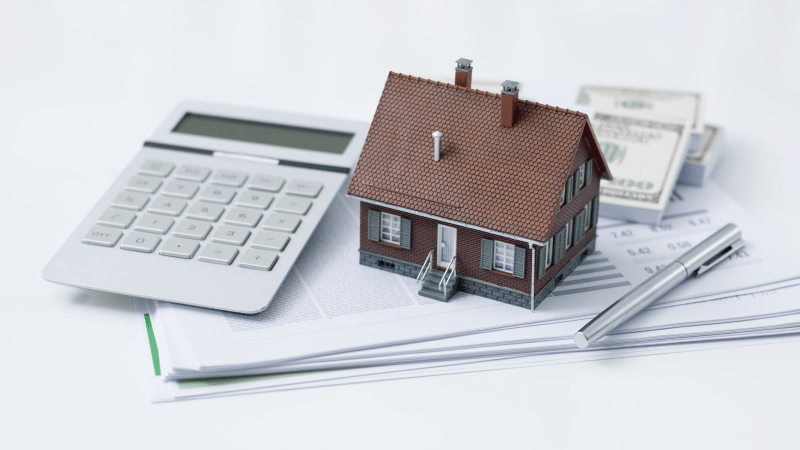Real Estate Capital Gains Tax Calculator
KEY TAKEAWAYS
- Capital gains tax applies differently to primary residences versus investment properties, with homeowners potentially qualifying for significant exclusions.
- Your holding period determines whether you pay short-term or long-term capital gains rates, making timing crucial for tax savings.
- A real estate capital gains tax calculator helps you estimate your tax liability before selling.
- Strategic planning and professional guidance can significantly reduce your overall tax burden.



 Outstanding Client Experience
Outstanding Client Experience Specialized Lending Solutions
Specialized Lending Solutions Direct-to-Consumer Advantage
Direct-to-Consumer Advantage We're Advisors, NOT Salespeople
We're Advisors, NOT Salespeople Effortless Digital Mortgage Platform
Effortless Digital Mortgage Platform
Selling real estate can generate significant profits, but understanding the tax implications beforehand prevents costly surprises. You need to know exactly how much you’ll owe in capital gains taxes before you sign that final paperwork. This guide walks you through everything you need to know about calculating capital gains tax on real estate, including step-by-step instructions and practical strategies to minimize your tax burden.
KEY TAKEAWAYS
- Capital gains tax applies differently to primary residences versus investment properties, with homeowners potentially qualifying for significant exclusions.
- Your holding period determines whether you pay short-term or long-term capital gains rates, making timing crucial for tax savings.
- A real estate capital gains tax calculator helps you estimate your tax liability before selling.
- Strategic planning and professional guidance can significantly reduce your overall tax burden.
Capital Gains Tax Calculator for Real Estate
Use a capital gains tax calculator for real estate to simplify these complex calculations and help you plan your sales strategy effectively. The calculator below processes your specific situation to provide accurate tax estimates.
Important Disclaimer: This calculator provides estimates for informational purposes only and shouldn’t replace professional tax advice. Capital gains rates change based on Congressional action, and your individual circumstances may create unique tax situations. Always consult a qualified tax professional for guidance specific to your situation.
What Is Capital Gains Tax in Real Estate?
Capital gains tax refers to the federal and state taxes you pay on the profit from selling real estate. The capital gains tax on real estate applies to the difference between your property’s sale price and its adjusted cost basis (original purchase price plus qualifying improvements minus depreciation).
The IRS categorizes capital gains into two types based on how long you owned the property. Short-term capital gains apply to properties you owned for one year or less, and the government taxes these gains as ordinary income at your regular tax rate. Long-term capital gains apply to properties you owned for more than one year, typically resulting in more favorable tax rates ranging from 0% to 20%, depending on your income level.
For example, if you purchased a rental property for $200,000 and sold it two years later for $300,000, you’d have a $100,000 long-term capital gain. However, if you sold the same property after only six months, that $100,000 gain would be taxed as short-term capital gains at your ordinary income tax rate.
Understanding this distinction becomes crucial when planning your real estate transactions. The difference between short-term and long-term rates can save you thousands of dollars in taxes. Many investors strategically time their sales to qualify for long-term treatment, especially when their gains are substantial.
When Do You Owe Capital Gains Tax on Real Estate?
Your tax obligations depend primarily on whether you’re selling your primary residence or an investment property. The IRS provides generous exclusions for primary residence sales, allowing single filers to exclude up to $250,000 in capital gains and married couples filing jointly to exclude up to $500,000. You must have lived in the home as your primary residence for at least two of the five years before the sale to qualify.
Investment properties don’t qualify for these residential exclusions, meaning you’ll likely owe capital gains tax on any profit. However, you can offset gains with losses from other investments and take advantage of depreciation deductions you claimed during ownership. The complexity increases when you consider property taxes and other holding costs that may affect your overall tax situation.
Several factors determine whether you owe capital gains tax:
- Property type: Primary residence versus investment property significantly impacts your tax liability.
- Ownership duration: Properties held longer than one year qualify for preferential long-term rates.
- Usage patterns: Converting between personal and rental use affects eligibility for exclusions.
- Income levels: Higher earners may face additional Medicare surtax on investment income.
- State residency: Some states impose their own capital gains taxes, while others don’t tax capital gains at all.
- Previous exclusion usage: You can only use the primary residence exclusion once every two years.
How to Calculate Capital Gains Tax on Real Estate
Learning how to calculate capital gains tax on real estate involves a systematic five-step process that determines your exact tax liability. This capital gains tax real estate calculator methodology ensures you account for all relevant factors affecting your final tax bill.
- Determine your selling price: Start with the gross sale price listed in your purchase agreement. This represents the total amount the buyer pays for your property before any deductions or adjustments.
- Calculate your cost basis: Subtract your original purchase price from the selling price, but don’t stop there. Your cost basis includes the original purchase price plus qualifying capital improvements you made during ownership. Capital improvements include renovations that add value, prolong the property’s life, or adapt it to new uses.
- Adjust for improvements and selling costs: Add your documented capital improvements to increase your cost basis, which reduces your taxable gain. Simultaneously, subtract selling expenses like real estate commissions, attorney fees, title insurance, and marketing costs from your gain calculation.
- Apply exclusions or exemptions: For primary residences, apply the $250,000 (single) or $500,000 (married filing jointly) exclusion if you qualify. Investment properties don’t receive this exclusion but may qualify for other strategies like 1031 exchanges.
- Determine your tax rate: Apply the appropriate tax rate based on your holding period and income level. Short-term gains face ordinary income tax rates, while long-term gains benefit from preferential rates of 0%, 15%, or 20% plus potential Medicare surcharge.
Factors That Impact Capital Gains Tax
Multiple variables influence your final capital gains tax liability, and understanding these factors helps you make informed decisions about timing and strategy. Smart planning around these elements can significantly reduce your tax burden.
The following key factors affect your capital gains calculation:
- Home improvements and renovation costs: Documented capital improvements increase your cost basis and reduce taxable gains. Keep detailed records of all qualifying improvements, including receipts, permits, and contractor invoices.
- Selling expenses and commissions: Real estate agent commissions, attorney fees, title insurance, and marketing expenses reduce your taxable gain dollar-for-dollar.
- Depreciation recapture for rental properties: If you claimed depreciation deductions on investment property loans, you must “recapture” this depreciation and pay taxes at ordinary income rates up to 25%.
- Market conditions and holding period: Market timing affects your gain amount while holding periods determine whether you qualify for long-term capital gains treatment.
- Strategic timing considerations: Coordinating sales with other income events, retirement timing, or major life changes can optimize your overall tax situation and take advantage of various tax benefits.
Tips to Minimize Capital Gains Tax on Real Estate
Strategic planning significantly reduces your capital gains tax burden through legitimate methods the IRS specifically allows. These approaches require advance planning but can save substantial amounts in taxes.
Consider these proven strategies to minimize your tax liability:
- Maximize the home sale exclusion: Live in your property as a primary residence for at least two of the five years before selling to qualify for up to $500,000 in tax-free gains for married couples.
- Convert property use strategically: Transform rental properties into primary residences before selling, or convert primary residences to rentals to take advantage of different tax treatments.
- Use 1031 exchanges for investment properties: Defer capital gains taxes indefinitely by exchanging investment properties for like-kind properties of equal or greater value within specific timeframes.
- Time sales strategically: Coordinate multiple property sales across different tax years to manage your tax bracket and avoid pushing yourself into higher capital gains rates.
- Harvest tax losses: Offset capital gains with losses from other investments to reduce your overall tax liability.
- Consult professional advisors: Work with qualified tax professionals and mortgage experts who understand current regulations and can identify opportunities specific to your situation.
Try Out Our Real Estate Capital Gains Tax Calculator

You now have the knowledge and tools to calculate capital gains tax on real estate with confidence. The strategies and calculations outlined above provide the foundation for optimizing your tax situation while maximizing your real estate profits.
Remember that smart real estate investors rely on professional tools and expert guidance to navigate complex tax situations successfully. At Griffin Funding, we provide comprehensive real estate financing solutions along with access to our Griffin Gold app, which features smart calculators, credit management tools, budgeting features, and streamlined mortgage planning to support your entire real estate journey.
Ready to take control of your real estate tax planning? Calculate your potential capital gains tax liability today and explore strategies to minimize your tax burden. The informed decisions you make now will shape your future financial success.
Explore your mortgage options today with Griffin Funding!
Find the best loan for you. Reach out today!
Get StartedRecent Posts
Down Payment Calculator
Planning to buy a home? One of the biggest questions you’ll face is figuring out how much cash you need ...
No Capital Gains Tax on Home Sales Legislation: What to Know
The current tax structure creates challenges for homeowners who have seen their property values soar over rece...
Bank Statement Loan Document Checklist
The main difference between bank statement loans and conventional mortgages is how your income is verified. Tr...









